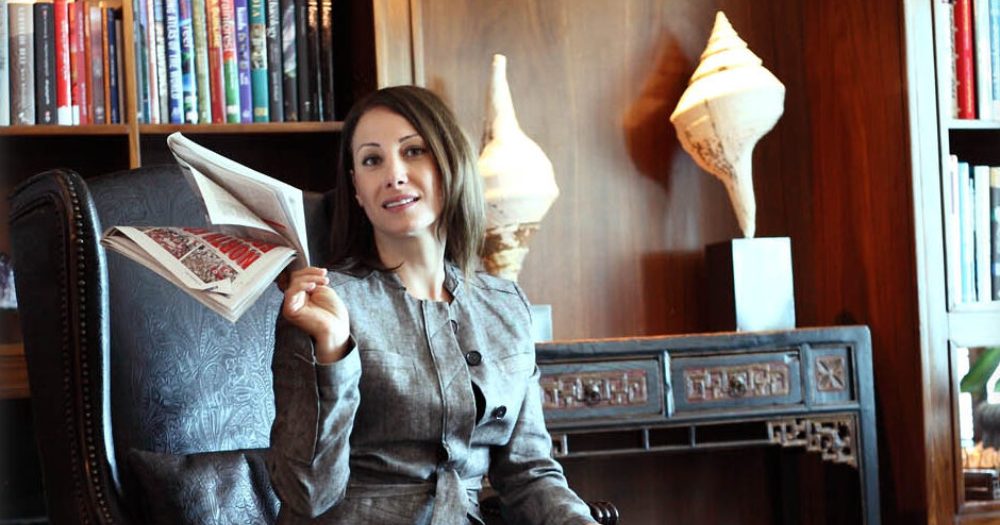Interview with Lubna Forzley, founder & CEO of mental health startup Stories

Lubna Forzley had a unique vision for her startup, one that doesn't offer services for the general public — but rather for founders and corporate leaders dealing with the everyday stress of the job. And so, she built Stories, and we decided to interview her. Here's what she had to say...
1. Can you tell us a bit more about yourself? What's your background?
My background is in two areas...
I have an interesting background, which includes a fusion of Marketing, Coaching & Mental Health. I spent 15 years building Marketing teams in global organizations before I transitioned to becoming a certified coach. I then spent a few years studying mental health, especially through Dr. Gabor Maté's psychotherapy program called "Compassionate Inquiry."
2. Let's speak about your company. What is the market problem you want to solve and where do you see the opportunity?
Today 9 out of 10 startups fail and 85% of employees are not engaged in the workplace. If you look at the reasons why they fail, there are many reasons that are publicly listed, but we truly believe that startups fail because they don't have the resilience to keep going. And what I would love to do is to support them with resilience and their mental health so that they can keep going in the right direction and succeed.
We want every founder, executive, and leader to get their story right in order to grow.
3. What are the features differentiating your offering from competitors?
The solution that we have is a coaching portal that connects leaders within organizations with coaches, so that they can succeed.
We offer one-on-one coaching, group coaching, and we also have a community of founders and HR leaders who can come together every quarter to discuss their challenges in a very transparent way.
Whereas many digital mental health services target employees or the general public - with Stories, we are targeting leaders in organizations of all sizes with a special focus on startups.
4. Can you share some numbers and achievements of the business?
I wouldn't announce clients, but I would say that we've been in operation for a year. During that time, we launched two communities (HR and founder communities), and we had a lot of global leaders joining us.
For example, for our HR event, we had members from 20 countries joining us. That was a great success with even members of the founders community participating.
We have managed to raise a significant level of awareness on mental health and coaching and received the MENTL award for the "Most Innovative Mental Health Tech."
5. What are your medium-term plans?
We had amazing conversations and leads that hopefully will materialize in 2024. We are trying to get VCs to partner with us in order to bring the service to their portfolio companies.
Unrelated to that, we will continue to raise awareness about mental health in the region so that more people will feel compelled to ask for professional help when they need it.
6. Do you have some advice for other entrepreneurs in the digital health space in MENA?
The digital health space is quite new to the region, and in my case, the whole concept of mental health is still taboo. And so we're trying to change that.
The biggest advice that I would have is to have enough runway because it will take time to turn your company into a profitable idea. You are shifting perceptions, and digital health is new, and you'll want to make sure that you are resilient enough and have enough runway to go through the process.
The second advice would be to understand what people want and to meet them where they are. To that end, we've done a lot of listening with corporates and founders last year to better understand their needs and meet them where they're at.
Sometimes, when you launch a company, your offering does not meet the demands of what people want. And so you have to keep pivoting and adapting your offering in order to give them what they really want. So, listen to your clients and do a lot of market research.
In our case, we know that founders want coaching, but they may not be able to finance it. Also, some VCs may not be ready to finance that, so you must always keep adapting, listening, and understanding. What do they really want and what are they willing to pay for? And to try to fine-tune your product.
7. Anything to add for the end?
I hope to see more government support in the [digital health] space with the government not creating hurdles. I would also like to see more progressive VCs putting more effort into digital health and mental health in particular. Not just investing in companies in the sector, but also supporting their portfolio companies with related services. I think that would be really good because it is needed. We just don't have it yet in MENA, but hopefully, things will change.
💡Did you know?
You can take your DHArab experience to the next level with our Premium Membership.👉 Click here to learn more
🛠️Featured tool
 Easy-Peasy
Easy-Peasy
An all-in-one AI tool offering the ability to build no-code AI Bots, create articles & social media posts, convert text into natural speech in 40+ languages, create and edit images, generate videos, and more.
👉 Click here to learn more


